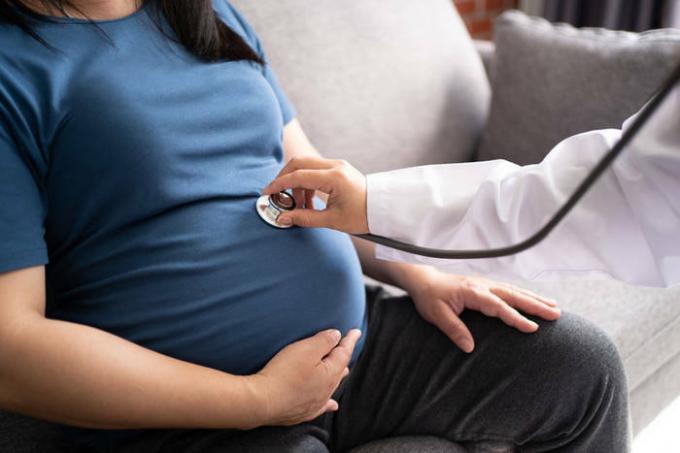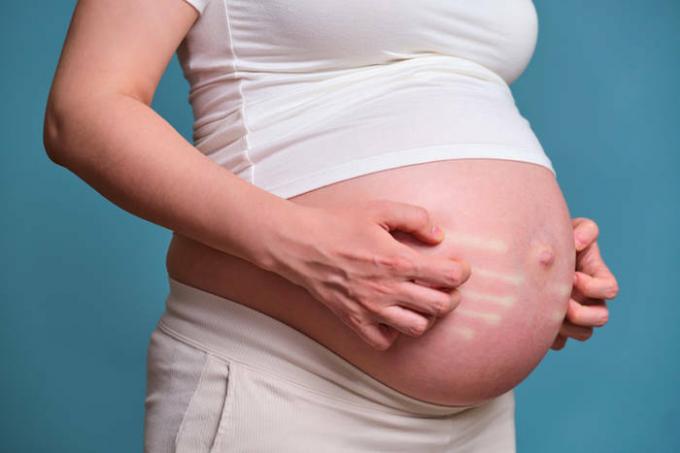Skin itching is not always a sign of an allergy. During pregnancy, it can be a symptom of a serious complication that provokes a miscarriage or early birth.
During pregnancy, women tend to listen to their body and pay attention to various unpleasant, strange or atypical symptoms. But there are such symptoms that are easy to confuse with relatively safe conditions for a pregnant woman. Because of this, a woman may not attach importance to her, or even try to “drown out” with medicines or folk remedies. So the American Christina DePino almost confused allergies with cholestasis of pregnant women. This condition is potentially dangerous for the fetus, and in 15% of cases leads to miscarriage or premature birth.
Skin itching as a sign of illness

Christina DePino went to the doctors on time / Facebook photo Christina DePino
Christina's pregnancy proceeded normally and without complications. However, at 35 weeks, the American woman suddenly began to be disturbed by unpleasant skin itching. The whole body itched, but the area of the abdomen, palms and soles of the feet itched most of all. At first, the woman was not too worried, and suspected an allergic reaction. However, I did not find any potential allergens either in food or in the house. Meanwhile, the itching intensified - it got to the point that Christina could not sleep at night and combed her body until it bled. Then she wrote about her condition on Facebook and asked friends and acquaintances for advice.
Luckily, one of Christina's friends was a nurse. It was she who connected the intense skin itching of the expectant mother not with allergies, but with liver problems. She advised the woman to see a doctor without delay. Based on the results of tests and examinations, Kristina was diagnosed with intrahepatic cholestasis of pregnancy (ICP).
This disease occurs in 22-27% of pregnant women, and can be quite dangerous for the baby. According to medical observations, in about 15% of cases, it leads to the death of the baby in the womb or provokes premature birth. Kristina was taken under observation in time and, by the decision of the doctors, she underwent artificial labor induction at the 37th week of pregnancy. The baby was born healthy, and her mother still remembers with gratitude that post on social networks that helped her seek advice.
What is ICP and why does it occur?

Cholestasis usually develops in the third trimester / istockphoto.com
Intrahepatic cholestasis of pregnancy is a disease that is caused by abnormalities in the functioning of the liver and pancreas. It usually appears in the third trimester of pregnancy, from 30 to 36 weeks. Violations can be caused, first of all, by heredity and chronic diseases (hepatitis, cholelithiasis, gallbladder dyskinesia, chronic cholecystitis). They are also provoked by changes in the hormonal background and fetal pressure on the bile ducts (therefore, the risk of developing ICP is increased in multiple pregnancies).
If it is very simple, then the problem can be explained as follows: with ICP, the production and outflow of bile are disturbed. As a result, it does not enter the intestines, but into the bloodstream, thereby causing itching on the skin, and sometimes a condition called pregnancy jaundice. There are no specific medications for ICP - cholestasis usually goes away on its own after the baby is born. However, in some cases, the amount of bile in the mother's bloodstream may exceed the maximum allowable rate - this is fraught with the development hypoxia in a childand, and can cause his intrauterine death.
By what symptoms to determine the disease

Unbearable itching is just one of the symptoms of ICP / istockphoto.com
At the same time, it also happens that the itching does not bother a woman much. In this case, you need to pay attention to other symptoms of cholestasis:
- discomfort and a feeling of fullness in the right hypochondrium, which can "give" to the lower back, as well as to the right shoulder blade or arm;
- change in the color of urine - it becomes dark, with a "thick" saturated odor;
- stool disorders - at first the woman is worried about the disorder, the stool comes out light yellow or gray and has a liquid consistency, and then, on the contrary, constipation begins;
- nausea, bitter taste in the mouth, urge to vomit and lack of appetite;
- discoloration of the skin and mucous membranes: at first, yellowness is noticeable only in the whites of the eyes, but gradually the skin of the face and body acquires a yellow tint.
If you have one or more of these symptoms, you should immediately consult a doctor. You will be prescribed a general and biochemical blood test, liver tests, and a coagulogram. You will also need to do an ultrasound for diagnosis.
The examination will help determine the severity of the disease: if there is no threat to the life of the child, the mother will be prescribed a diet with the exclusion of fatty, spicy and salty foods, as well as drinking plenty of water. If the situation is critical, the woman will be taken under observation: usually, in severe cases of ICP, doctors try to “bring” the patient to at least 37 weeks of pregnancy, and then artificially stimulate laborto reduce the toxic effect of the disease on the child.
You will also be interested in reading:
Be careful: the most dangerous periods during pregnancy
Headache during pregnancy: how to help yourself without medication

